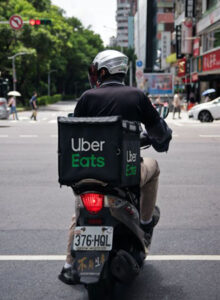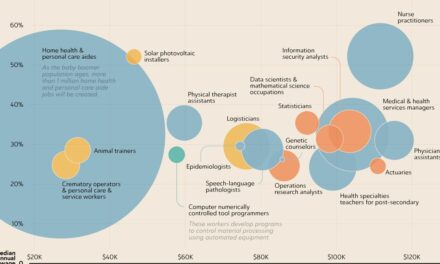 In the old days, a person worked their entire life for a company, earning a steady wage or salary and benefits. But changing circumstances – from technological change to the encroachment of big government – are forcing more and more companies to hire a more agile workforce of freelancers.
In the old days, a person worked their entire life for a company, earning a steady wage or salary and benefits. But changing circumstances – from technological change to the encroachment of big government – are forcing more and more companies to hire a more agile workforce of freelancers.
A number of big thinkers not only foresee a continuation of this trend – from employees to freelancers – but an acceleration over the coming years. One such author, investor and entrepreneur – James Altucher – predicts that we’ll eventually see an employee-free society, where everyone is essentially self-employed.
James says that…
Before 200 years ago, we never really had employees. Then there was the rise of corporatism (which many have confused with capitalism).
Farmers, merchants, and tradesmen were their own bosses throughout the history of work. Even manual laborers – at least those who were not slaves and soldiers – did not have indefinite employers. They were independent contractors.
I’m on the board of a $1 billion in revenue employment agency. It’s gone from $200 million in revenues to $1 billion just in the past few years. Why did we move up so fast when the economy has basically been flat?
For two reasons:
1. The Pareto principle, which says that 80% of the work is being done by 20% of the people. So a lot of people are being fired now, since 2009 gave everyone the carte blanche excuse.
Ditto for the post-COVID world. Many employees who were furloughed due to the lockdowns, are discovering that their “temporary layoffs” are actually permanent.
2. Regulations that are too difficult to follow. It’s getting pretty difficult to figure out what you need to do with an employee. Health care is a great example, but there are 1,000 other examples.
The hard truth is that many of the minimum wage jobs simply aren’t worth the $15 per hour (plus benefits) to their employers. The laundry list of time and financial burdens borne by the employer are much more numerous than most people realize: compliance with local, state and federal laws; compliance with union contracts; employee training and education; paid sick leave; the employer portion of Social Security and Medicare taxes; unemployment taxes (which are borne completely by the employer); uniforms; additional benefits, etc. There’s little wonder why industries highly dependent on labor – like fast food – are scrambling to streamline operations and reduce labor costs. The Burger King of the future will revolve around drive-thrus and pick-up windows.
So what’s happening, for better or worse, is a rising wave of solo-preneurs and lifestyle entrepreneurs – exactly what happened for the hundreds of years that capitalism was around before stiff and rigid corporatism (teamed with unions) became the primary but fake “stable” force in our lives.
Many would argue that this is just the natural evolution of most occupations (and on a larger scale, most industries). In the early days, jobs are small-scale, innovative, creative and often well-compensated. In this instance, people dominate. In the later phases, however, these occupations and industries become large-scale, standardized, repetitive, and less financially lucrative. Cost-effective automation displaces people.
This is why companies like Uber are flourishing. You have a workforce (the drivers), logistics software in the middle, and people willing to pay for that workforce.
Today we even have the expression “uberization”. It describes the commoditization of an existing service-based industry by new participants using computing platforms, such as mobile applications, in order to aggregate transactions between clients and providers of a service, often bypassing the role of existing intermediaries as part of the so-called platform economy.
Our GDP and our startups are going to start to drift in the Uber direction. Uber in San Francisco, for example, provides multiples times as many rides as all the cab drivers in SF combined.
 Gig economy companies like Uber illustrate the direction that employment is headed in many industries. Apart from transportation companies that connect the drivers directly with the client, there are a host of other sectors adopting the on-demand concept as well. Internet-based technological platforms linking providers (gig-workers) with customers, are starting to appear in: accommodations, caregiving, delivery, education, legal, retail, home services, and business services. (See some of the gig economy companies already listed on major stock exchanges.) And, no doubt, we will see further sectors adopting on-demand business models as well.
Gig economy companies like Uber illustrate the direction that employment is headed in many industries. Apart from transportation companies that connect the drivers directly with the client, there are a host of other sectors adopting the on-demand concept as well. Internet-based technological platforms linking providers (gig-workers) with customers, are starting to appear in: accommodations, caregiving, delivery, education, legal, retail, home services, and business services. (See some of the gig economy companies already listed on major stock exchanges.) And, no doubt, we will see further sectors adopting on-demand business models as well.
Corporate life was never really stable, and now we know that.
The problem is: while we were all in our cubicles (and I’ve been guilty of this for many years as well), we stopped being creative, stopped having ideas, and just took orders from the gatekeepers: bosses, colleagues, government, education, family.
A lot of people are stuck in the mindset of this old employee-employer paradigm. They don’t see the importance of upgrading and changing their skills. They’re still looking for direction from employers and government to do so.
We let other people choose what was best for us instead of doing the choosing ourselves. If you let someone else do the choosing for you, the results won’t be good, and you’ll get resentful. Bad things will happen.
While the private and public sectors can encourage and incentivize skill acquisition, its up to everyone to recognize the momentous trend taking place. The move towards an employee-free society, where everyone is their own boss, means its more important than ever to adopt a philosophy of lifelong learning. And thankfully, the trend in online learning has made education more accessible and cheaper than at any other time in history.
Benefits Of Freelancing Versus Traditional Employment
Freelancers with a diversified group of clients are financially safer than employees with a single employer. While some people perceive stability as working years and decades for a single company, this may be a falsehood in today’s quickly changing world. Technological and societal change is happening so quickly that new professions are springing up – and old occupations disappearing – literally overnight. True stability and risk aversion, therefore, is diversifying your income across multiple contractors, multiple sectors, and even multiple geographical regions.
Freelancers can market their skills at their own terms and rates. There is the freedom to choose your own projects, choose a flexible work schedule, and the ability to work from anywhere. Thanks to high speed internet and broadband, which is literally available anywhere in the world, its convenient for freelancers to quickly connect, communicate and complete work remotely and safely. Its more easy to juggle child care, plus there’s always the option to add additional income streams by taking on new clients or an unrelated side hustle.
Benefits Of Hiring Freelancers Versus Payrolled Employees
Businesses benefit from the flexibility freelancers allow. Business owners can hire for project specific jobs that may only be temporary, or perhaps periodic, without the need to hire for full-time or part-time positions. This helps businesses circumvent the huge time and financial burdens involved when hiring payrolled employees.
And thanks to ever improving technology, working with freelancers has never been easier. Many small businesses lack effective operating procedures, but many of the gig economy companies provide management tools that integrate finding, hiring, managing and paying freelancers – all in one seamless platform. Businesses can connect to freelancers quickly and request work in an efficient and timely manner. The gig economy allows businesses to build a network of really good workers that they can call upon, whenever projects come up.
Where Will Future Freelance Opportunities Come From?
 The gig economy has sparked innovative ideas from entrepreneurs building companies that are paving the way for the future of employment. So where will disruptive gig economy companies appear next? What sectors are ripe for a future in freelancing – for working as a solopreneur? The realm of possibilities seems to be limitless. Probably anywhere there is currently a middleman, a gatekeeper that lies between the workforce and the customers. The need for an intermediary is less and less essential.
The gig economy has sparked innovative ideas from entrepreneurs building companies that are paving the way for the future of employment. So where will disruptive gig economy companies appear next? What sectors are ripe for a future in freelancing – for working as a solopreneur? The realm of possibilities seems to be limitless. Probably anywhere there is currently a middleman, a gatekeeper that lies between the workforce and the customers. The need for an intermediary is less and less essential.
One thing to keep in mind, is that the rise of machine learning, AI, robotics and automation, is no doubt going to displace a lot of the manual, repetitive tasks that are currently fulfilled by people. To build resilience as a freelancer, its therefore important to concentrate on soft skills that require empathy, compassion, creativity and imagination. Machines are poor at replicating human interaction: how many times have you been frustrated when trying to “communicate” with an automated call center? That said, new opportunities in the gig economy are appearing all the time, so flexibility and the ability to quickly adapt are also a requisite.
Gig Economy Stocks To Keep An Eye On
The number of freelance workers is growing at a very rapid pace, both in the U.S. and globally. At the current growth rate, the majority of the U.S. workforce will become freelance workers by the year 2027 (according to a study commissioned by Upwork and Freelancers Union). This, of course, creates a major investment opportunity. But which companies allow you to play the growth of the gig economy – a move towards an employee-free society?
Below we’ve outlined 14 gig economy companies across various geographical regions and from various sectors of the economy. Like the big social media platforms, many of these companies have developed a distinct industry moat thanks to the first-mover advantage. In particular, they benefit from a network effect (when the more users a platform has, the more value it provides for its current user base). Plus, their industry moat is strengthened (or deepened) by the fact that both freelancers and clients actively build their reputations. Buyers and sellers are less likely to leave a platform (for a new one), when they’ve worked hard accumulating hundreds or thousands of great reviews.





